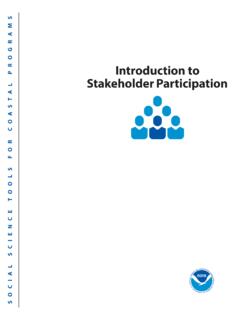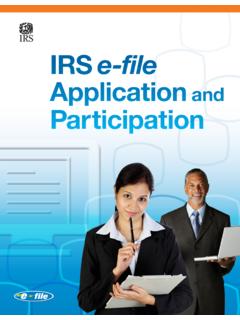Transcription of Participation of young people in education, employment …
1 Participation of young people in education , employment or training Statutory guidance for local authorities September 2016 2 Contents Summary 4 About this guidance 4 Review date 4 What legislation does this guidance refer to? 4 Who is this guidance for? 4 Main points 5 Responsibilities of local authorities 5 Duties on local authorities relating to Participation 5 Funding 6 Delivering the broad duties on local authorities to support Participation 7 Scotland and Wales 11 RPA duties 11 Duty on young people 11 Duties on providers 11 Duty on local authorities to promote Participation 12 Duty on local authorities to identify young people not participating 13 Specific circumstances and exceptions 14 young people with diverse identities and backgrounds 15 Annex 1 - defining Participation 16 Full-time education 16 Apprenticeships 17 Traineeships 17 Supported internships 18 Full-time work with part-time education or training 18 young people attending
2 Non-registered education institutions 19 young people joining the armed forces 19 3 young people with full-time caring responsibilities 19 young parents 19 young people in jobs without training 20 young people in jobs with training that does not lead to relevant regulated qualifications 20 young people taking breaks in their formal education or training 20 Annex 2 - duties on other organisations in relation to RPA 22 Careers requirement on schools and colleges 22 Schools 22 Colleges 22 Intensive support for pupils and students 22 Careers and SEND 23 Duties on employers 23 Annex 3 - effective re-engagement 24 The principles of effective re-engagement 24 4 Summary About this guidance 1. This is statutory guidance from the Department for education (the department).
3 A local authority must have regard to it when exercising its functions relating to the Participation of young people in education or training. The annexes to this guidance contain departmental advice to help recipients understand what the department considers the statutory provisions to mean in particular circumstances. Review date 2. The department will keep this guidance under review and will publish updated versions when they are needed. What legislation does this guidance refer to? 3. This guidance is issued under sections 18 and 68(4) of the education and Skills Act 2008 (ESA 2008) in relation to sections 10, 12 and 68 of that Act. Who is this guidance for? 4. This guidance is for all local authorities in England.
4 5 Main points 5. The law requires all young people in England to continue in education or training until at least their 18th birthday, although in practice the vast majority of young people continue until the end of the academic year in which they turn 18. Please see Annex 1: defining Participation for further information. Improvements are being made to careers education and guidance, and the government s ongoing reforms to technical education and training, apprenticeships, traineeships, and supported internships are continuing to improve the offer for young people . The proportion of young people not in education , employment and training (NEET) fell again to a record low level in 2015. 6. Whilst the department provides the framework to increase Participation and reduce the proportion of young people NEET, responsibility and accountability lies with local authorities.
5 Local authorities have a critical role to play in supporting young people to access education and training and therefore in understanding the characteristics and current activity of the young people in their area. The role of local authorities is outlined in their broader Participation duties, as well as in their Raising the Participation Age (RPA) related duties. This guidance sets out these duties, as well as the crucial roles that schools, colleges and training providers have with regard to post-16 Participation . 7. The department monitors the performance of local authorities in delivering their duties, and specifically in their tracking and supporting of 16 and 17 year olds, using data collected by authorities and submitted to the National Client Caseload Information System (NCCIS).
6 NCCIS includes data showing the numbers of young people participating in education or training, those who are not participating, those who are NEET or those whose current activity is not known. Responsibilities of local authorities 8. The government s approach is to give local authorities freedom and flexibility to decide how to fulfil their statutory duties. That is why we are only specifying key activities to help them to fulfil those duties. Local authorities must have regard to the following guidance when deciding how to organise and resource their services. Duties on local authorities relating to Participation 9. Local authorities have broad duties to encourage, enable and assist young people to participate in education or training.
7 Specifically these are: To secure sufficient suitable education and training provision for all young people in their area who are over compulsory school age but under 19 or aged 19 to 25 and for whom an education , Health and Care (EHC) plan is maintained. This is a duty 6 under the education Act 1996 1. To fulfil this, local authorities need to have a strategic overview of the provision available in their area and to identify and resolve gaps in provision. To make available to all young people aged 13-19 and to those between 20 and 25 with special educational needs and disabilities (SEND), support that will encourage, enable or assist them to participate in education or training under Section 68 of ESA 20082.
8 10. Tracking young people s Participation is a key element of these duties. Local authorities are required to collect information about young people so that those who are not participating, or are NEET, can be identified and given support to re-engage. Robust tracking also provides the local authority with information that will help to ensure that suitable education and training provision is available and that resources can be targeted effectively. 11. In addition, ESA 2008 placed two RPA-related duties on local authorities with regard to 16 and 17 year olds: Local authorities must promote the effective Participation in education and training of 16 and 17 year olds in their area with a view to ensuring that those persons fulfil the duty to participate in education or training3.
9 A key element of this is identifying the young people in their area who are covered by the duty to participate and encouraging them to find a suitable education or training place. Guidance on this duty is included at paragraphs 39 to 42. Local authorities must make arrangements maintain a tracking system - to identify 16 and 17 year olds who are not participating in education or training4. Putting in place robust arrangements to identify young people who are not engaged in education or training or who have left provision enables local authorities to offer support as soon as possible. Guidance on this duty is included in paragraphs 43 and 44. Funding 12. Local authorities are expected to meet any costs incurred in the delivery of the above from their overall budgets, including central government grants.
10 13. Funding for education and training provision for 16 to 19 year olds and those aged 19-25 with an EHC plan is provided to schools, colleges and training providers by the 1 Sections 15ZA and 18A of the education Act 1996 (as inserted by the Apprenticeships, Skills and Children and Learning Act 2009) and Part 3 of the Children and Families Act 2014. 2 Section 68 education and Skills Act 2008 as updated by Section 20 of the Children and Families Act 2014. 3 Section 10 education and Skills Act 2008. 4 Section 12 education and Skills Act 2008. 7 education Funding Agency (EFA)5; 16-18 year olds' apprenticeship funding is routed to providers by the Skills Funding Agency6, and for those students with high needs by the relevant local authority through a system of top up funding7.














